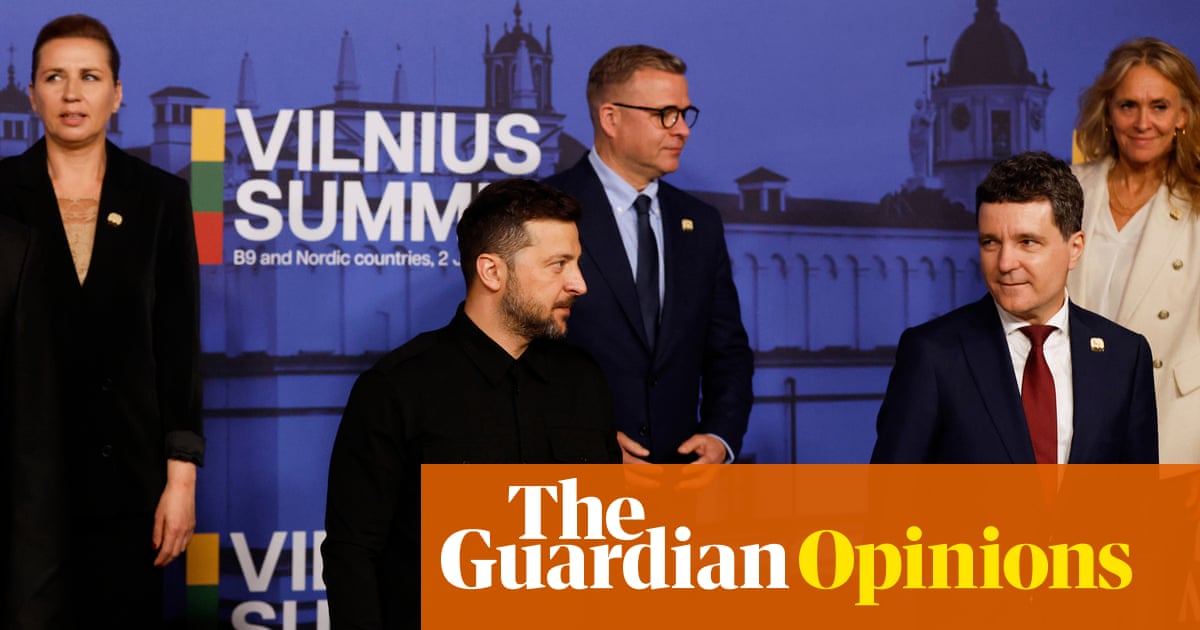With Europe’s political kaleidoscope spinning wildlyin the populist winds, a group of northern countries is gaining weight as a geopolitical anchor. Known as the Nordic-Baltic eight (NB8 in diplomatic jargon), it brings together small northern European states that, individually, might have little clout in international security and politics. But since Russia’s full-scale invasion of Ukraine in 2022, they have wielded growing influence as apressure groupfor western resolve, offering an attractive blend of democratic security, defence integration and societal resilience.
Denmark, Estonia,Finland, Iceland, Latvia, Lithuania, Norway and Sweden established their regional cooperation format in 1992, after the end of the cold war, with regular meetings of prime ministers, parliamentary speakers, foreign and defence ministers and senior government officials. It began as a forum for wealthy, stable Nordic countries to rebuild bridges with Baltic neighbours with whom they had traded and exchanged for centuries but who had been trapped behind the iron curtain under Soviet rule since the second world war.
The group’s salience has grown in the new geopolitical era of great-power rivalry in which the Arctic, the North Atlantic and theBaltic Seahave once again become strategically contested zones. “The world is changing rapidly … the most important thing is to rearm Europe,” the Danish prime minister, Mette Frederiksen, the present chair of the NB8, said in explaining why Copenhagenno longer sees its placeas one of the”frugal” countriesopposed to higher EU spending. Denmark will also hold the rotating presidency of the Council of the European Union from July, giving the Nordic region greater visibility.
While national-populist politicians havegained groundin central Europe, making the region more Eurosceptic and less supportive of Ukraine, the Nordics and Baltics remain a bastion of support for Kyiv and for European and Nato defence efforts, even as their policies on migration have toughened under pressure from their own populists.
The NB8 countries were involved from the outset in the Franco-British “coalition of the willing”, established to backUkrainemilitarily and politically when Donald Trump suspended US assistance to Kyiv in an attempt to strong-arm Volodymyr Zelenskyy into a peace deal on Russian terms. As Frederiksen puts it, they see Ukrainian independence and defeating Moscow’s aggression as being in their own vital interest, given their geographical proximity to Russia.
Both Nato and the EU are drawing extensively on the “total defence” playbook of Finland and Sweden to engage the public and private sectors and civil society in military readiness, civil preparedness and economic resilience in the face of Russian and Chinese hybrid warfare tactics. There is much to learn from their whole-of-society approach.
Finland, for instance, with a population of 5.6 million and just 24,000 in the peacetime armed forces, can rapidly mobilise a wartime army of 180,000 and has a reserve force of 870,000 trained soldiers, thanks to a system of conscription and regularreserve duty. Business leaders are often also reserve officers. They attend regular security seminars and have legal obligations to maintain stocks, share logistics and have spare production capacity for times of crisis. Having fought two wars with the Soviet Union alone in the 1940s, the country maintains enough well-stocked bomb shelters for its entire population.
Last year, Sweden mailed an updated version of a booklet to 5m householdsadvising citizenshow to act “in case of crisis and war”, including stockpiling non-perishable food, and having a battery-operated radio and torch, a first aid kit and other necessities. The European Commission recently recommended all member states takesimilar actionto prepare their populations for potential emergencies.
The NB8 members regularly caucus before Nato and EU meetings – although Norway and Iceland are not EU members – and coordinate their diplomacy worldwide. Symbolically, the Nordic five share anembassy complexand cultural centre in Berlin, capital of Europe’s biggest economy.
In Europe’s evolving power matrix, the Nordic and Baltic allies have the advantage of being stable, like-minded democracies with a broad consensus in support of defence and deterrence against Russia. That will make them dependable partners for the German chancellor, Friedrich Merz, at a time when Poland now facespolitical instability,France has no parliamentary majority and is shackled by debt, and Italy is reluctant to step up defence efforts.
All eight have linked their armies to the UK and the Netherlands through theJoint Expeditionary Force, maintaining high-readiness forces that are trained to respond rapidly to crises. They are working with Nato to protectvital underwater cablesand pipelines from Russian and Chinese sabotage efforts.
Some members have gone further in defence integration. For instance, four Nordic air forces this year created a Nordic division within Nato, whose task is to implement the Nordic Airpower Concept which enables Danish, Finnish, Norwegian and Swedish wings to operate as one force in high-readiness full-scale joint air operations. The three Baltic states are building ajoint defensive lineon their eastern borders modelled on Ukraine’s frontline defences. And Baltic countries are discussing an Estonian concept for a “Baltic drone wall”, using AI and sensors for border monitoring and counter-drone protection.
Even if they punch above their weight, there are limits to the NB8’s influence. Small, open economies rely on free trade and a stable global environment to prosper. Within the EU, the group has struggled unsuccessfully to stop the European Commission loosening itsstate aid enforcement rulesto allow more French and German subsidies to industry. More broadly, a world shaped by tariffs, climate inaction, illiberalism and big power spheres of influence is a toxic prospect for the Nordics and Baltics.
Growing protectionism and instability could spell high noon for Europe’s high north.
Paul Taylor is a senior visiting fellow at the European Policy Centre
